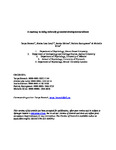A roadmap to doing culturally grounded developmental science
| dc.contributor.author | Broesch, T | |
| dc.contributor.author | Lew-Levy, S | |
| dc.contributor.author | Kline, M | |
| dc.contributor.author | Kärtner, J | |
| dc.contributor.author | Kanngiesser, P | |
| dc.date.accessioned | 2022-04-20T20:43:50Z | |
| dc.date.issued | 2022-04-20 | |
| dc.identifier.issn | 1878-5158 | |
| dc.identifier.issn | 1878-5166 | |
| dc.identifier.uri | http://hdl.handle.net/10026.1/19038 | |
| dc.description.abstract |
This paper provides a roadmap for engaging in cross-cultural, developmental research in practical, ethical, and community-engaged ways. To cultivate the flexibility necessary for conducting cross-cultural research, we structure our roadmap as a series of questions that each research program might consider prior to embarking on cross-cultural examinations in developmental science. Within each topic, we focus on the challenges and opportunities inherent to different types of study designs, fieldwork, and collaborations because our collective experience in conducting research in multiple cultural contexts has taught us that there can be no single “best practice”. Here we identify the challenges that are unique to cross-cultural research as well as present a series of recommendations and guidelines. We also bring to the forefront ethical considerations which are rarely encountered in the laboratory context, but which researchers face daily while conducting research in a cultural context which one is not a member. As each research context requires unique solutions to these recurring challenges, we urge researchers to use this set of questions as a starting point, and to expand and tailor the questions and potential solutions with community members to support their own research design or cultural context. This will allow us to move the field towards more inclusive and ethical research practices. | |
| dc.format.extent | 587-609 | |
| dc.language | en | |
| dc.language.iso | en | |
| dc.publisher | Springer Science and Business Media LLC | |
| dc.rights | Attribution-NonCommercial-NoDerivatives 4.0 International | |
| dc.rights.uri | http://creativecommons.org/licenses/by-nc-nd/4.0/ | |
| dc.subject | Cross-cultural research | |
| dc.subject | Developmental methods | |
| dc.subject | Diversity | |
| dc.title | A roadmap to doing culturally grounded developmental science | |
| dc.type | journal-article | |
| dc.type | Article | |
| dc.type | Early Access | |
| plymouth.issue | 2 | |
| plymouth.volume | 14 | |
| plymouth.publication-status | Published | |
| plymouth.journal | Review of Philosophy and Psychology | |
| dc.identifier.doi | 10.1007/s13164-022-00636-y | |
| plymouth.organisational-group | /Plymouth | |
| plymouth.organisational-group | /Plymouth/Faculty of Health | |
| plymouth.organisational-group | /Plymouth/Faculty of Health/School of Psychology | |
| plymouth.organisational-group | /Plymouth/REF 2021 Researchers by UoA | |
| plymouth.organisational-group | /Plymouth/REF 2021 Researchers by UoA/UoA04 Psychology, Psychiatry and Neuroscience | |
| plymouth.organisational-group | /Plymouth/REF 2021 Researchers by UoA/UoA04 Psychology, Psychiatry and Neuroscience/UoA04 Psychology, Psychiatry and Neuroscience MANUAL | |
| plymouth.organisational-group | /Plymouth/REF 2021 Researchers by UoA/UoA04 Psychology, Psychiatry and Neuroscience/UoA04 REF peer reviewers | |
| plymouth.organisational-group | /Plymouth/Users by role | |
| plymouth.organisational-group | /Plymouth/Users by role/Academics | |
| dcterms.dateAccepted | 2022-03-27 | |
| dc.rights.embargodate | 2023-4-20 | |
| dc.identifier.eissn | 1878-5166 | |
| dc.rights.embargoperiod | Not known | |
| rioxxterms.versionofrecord | 10.1007/s13164-022-00636-y | |
| rioxxterms.licenseref.uri | http://creativecommons.org/licenses/by-nc-nd/4.0/ | |
| rioxxterms.type | Journal Article/Review |



